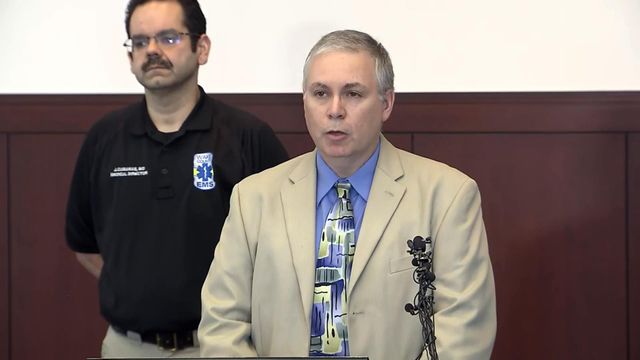'We expect more cases': Timeline of Wake coronavirus patient's arrival, symptoms, current status
A day after Wake County identified what is believed to be North Carolina's first case of coronavirus, the timeline of the patient's arrival, symptoms, contact with others and current status started to become more clear on Wednesday.
Posted — UpdatedNorth Carolina Secretary of Health and Human Services Dr. Mandy Cohen shared what officials have learned about the critical days since COVID-19 first arrived in Wake County – perhaps even before it was first detected – and the processes in place to help protect local residents.
After traveling back to the Triangle from Washington state, where he was exposed to coronavirus in a nursing home where an estimated 50 patients and staff were showing symptoms, the infected man was not symptomatic for three days, Cohen said.
Because he showed no symptoms of the illness, nobody on the flight or at RDU when he passed through was at risk of catching the virus, she said.
"We know they are most contagious when they are showing symptoms," she said. "The [Centers for Disease Control and Prevention] has been very clear in the guidance that they do not feel there is risk before folks are seeing symptoms.
"We can have peace of mind over that," she added.
Wake County's health department is working to understand when the man started to have symptoms and with whom he might have come in contact. Then, officials need to determine if they can find the people who had the potential to be exposed to coronavirus and see if they are having symptoms, Cohen said.
"The first thing to know is the way the virus spreads is not you walking through a hallway. You have to come in close contact, within 3 feet of someone for a prolonged period of time, so more than a couple of minutes," she said.
The man arrived back in the Triangle on Feb. 22 and began experiencing symptoms on Feb. 25, Cohen said. When he heard about the nursing home outbreak in Washington, he was already experiencing symptoms and realized he had been exposed, so he contacted his primary care doctor, she said.
The doctor notified state epidemiology experts, and a team went to the man's home Tuesday to test him. The nasal swab tested positive for COVID-19, but the sample has been sent to the CDC in Atlanta for confirmation, Cohen said.
Wake County public health staffers are checking on the man twice a day, Cohen said, adding that she visited the man's home and said he "is isolated at home [and] doing well." He doesn't need hospitalization, she said.
When he stops experiencing symptoms, she said, he'll be tested twice to ensure he no longer has the virus.
Public health staffers are "aggressively" searching to see if there are any other COVID-19 cases linked to this one, Cohen said.
"We are now doing any sort of contact that that person may have had while they were experiencing symptoms, and then we will contact those people and make sure they are well, do testing if we need to and go through that same procedure if we need to – isolate folks , test them, make sure they’re well," she said.
Ten to 20 people have been tested locally for the virus, she said.
"I want folks to know we expect more cases. That should not be a surprise," said Cohen. "Viruses spread, and it is something where folks do not have immunity to this virus because we’ve never seen it before."
"For the first time on Monday, we were able to start testing for COVID-19 here in our state lab," she said.
Cohen stressed that, while North Carolina has increased capacity for testing for the virus in the state, more is needed.
"First, we need more kits from the CDC. We are expecting those in the next couple of days," she said. "We are also hoping to bring on more labs at our university partners and other private lab partners over the next couple of weeks."
"This is a new virus the world has never seen before, and we have never seen in North Carolina, so I think it's appropriate to prepare," said Cohen. "That is what our team has been doing with the state, the local, the federal government."
She said that, although this is the first case of coronavirus in North Carolina, it's also cold and flu season, and people should be taking precautions to protect themselves from viruses anyway.
"Just to put this in perspective," she said, "we did have 15 deaths from flu just last week in North Carolina. Viruses are deadly, and we want to protect ourselves."
It's been repeated again and again, but the simple methods really do help, Cohen said.
"Wash your hands. Disinfect surfaces. Stay home if you're sick," she said. "We must protect each other. We don't have medicines or vaccines yet, so the way to protect ourselves and each other is with these simple methods."
Even before coronavirus was detected in Wake County, stores had bern selling out of supplies like hand sanitizer, masks, toilet paper and paper towels. However, hoarding masks and hand sanitizer could actually increase the community's overall risk of spreading coronavirus. The CDC has urged people to leave masks for people who are actually sick, to help them prevent spreading their illness, or health care workers who are directly exposed.
Likewise, hand sanitizer and soap needs to remain readily available to people can keep their hands clean and prevent viruses from spreading.
"We are prepared for this," said Cohen.
• Credits
Copyright 2024 by Capitol Broadcasting Company. All rights reserved. This material may not be published, broadcast, rewritten or redistributed.






